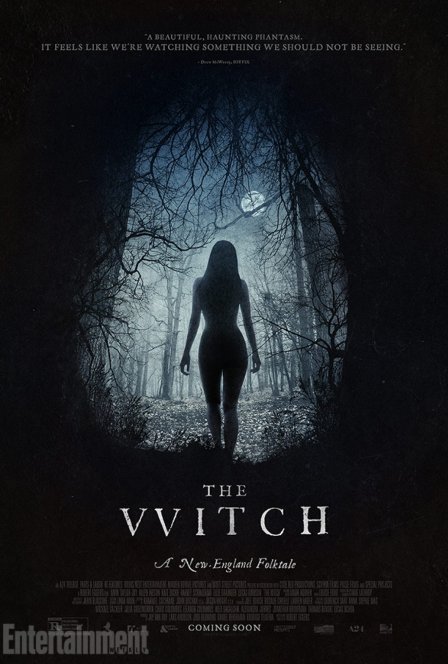Adapted from 17th Century puritan folklore with much of its dialogue lifted directly from documents of the time, Robert Eggers’s The Witch is a fully immersive experience that plunges the viewer without a life vest directly into its era and the stark, ascetic lifestyle of its inhabitants. After an abrupt opening sequence where the prideful William refuses to obey the laws of his community above those of his god, he, his wife and five children are banished to a small, remote farmhouse outside of town on the edge of a vast, foreboding forest. The horror clichés could practically write themselves from that point, but Eggers himself resists temptation at nearly every turn, instead choosing to spend a majority of the film examining the consequences of an unshakable faith and implacable religious fervor amidst the slow unraveling of the family unit.
At the center of it all is the eldest daughter, Thomasin, played with impressive maturity by Anya Taylor-Joy, who is the only one present when, upon moving to the farmhouse, her infant sibling mysteriously disappears during an innocent game of peek-a-boo. Her explanation wouldn’t cut it with most families, but her righteously devout, puritanical parents, who at first suggest it may have been a wolf, quickly become suspicious of her and the potential witchcraft that may be going on within the shrouded darkness of the nearby trees. While her mother, Katherine (Kate Dickie), becomes increasingly troubled by the thought of their unbaptized baby remaining in the devil’s clutch down below and begins acting increasingly coldly and cruelly towards Thomasin out of spite and desperation, William asserts himself as the patriarch and heads into the woods in search of answers. As more enigmatic events begin to occur, some family members, including the younger twins, whose constant teasing and singing of disturbing folk songs becomes a menacing force in itself, begin to suspect that Thomasin herself is a witch.
Eggers wisely keeps much of this paranoia, mistrust, and crisis of faith unspoken and bubbling beneath the surface, only making itself known once the flaws and evils of their rigid fundamentalism begin to rot away at the core of the family. William himself allows his daughter to take the brunt of the abuse before eventually confessing he stole and sold his wife’s family heirloom to feed them, ashamed that his ineffectual ways led to a mostly dead harvest and a shortage of food. As Thomasin later proclaims, he’s not good for much more than chopping wood, a ritual (or purging of masculine and sexual energies for which he has no other outlet to channel) that he is often seen partaking in. His shame manifests itself in accusations towards his daughter, whose only trusted sibling until this point, the slightly younger Caleb (Harvey Scrimshaw), has recently returned from the woods naked and alone. Faith in a higher power and commitment to untenable and quixotic laws transform into a fear of the other and belief that all outside forces are evil and threaten harm upon them. The internal psychological trauma of their puritanical lifestyle and its inevitable fallibility externalizes itself within those menacing woods and a fear and trembling like they’ve never known reigns down upon them.
In that sense, The Witch plays out as a self-fulfilling prophecy and earns its status as exactly what Eggers sought to achieve: a puritan’s nightmare come true. As a horror film, it has its moments of absolute terror, but it is far more concerned with the blurry line between forbidding all sins and inviting them upon you, and what effects such uncompromising rules and ideals may have upon a marriage and children. On a metaphorical level, it trumps all recent horror films (it is far more effective than even the much lauded The Babadook) because both the internal trauma and external peril retain an ambiguity and complexity that cannot simply be summed up in A-to-B causalities. There is, of course, a clear binary, but it is secondary, a mere backdrop to what Eggers is really concerned with.
Are the changes in Thomasin brought about due to her parents’ mentally abusive behavior, or does she herself seek respite beyond her property lines? Is her brother’s fate the cost of lusting after her or a warning meant for the rest of the family? The Witch treads carefully along such dichotomies, never tipping its hand, merely drawing us further and further into the unknown hazards that lie somewhere beyond. It is the rare debut film that never falters, confident in its vision, assured in its style and fully able to shake you to your core with both terrifying imagery and its emotionally raw drama.
As justly praised as the moments of sheer terror are, it is actually Eggers’ restrained, subtle directorial touches and minimalist visual palette, which mirrors the austere setting and values being critiqued, that allow the film’s brief flashes of utter depravity and evil to immediately burrow themselves deep into the viewer’s subconscious. Its points of reference are much closer to the horror films of Carl Theodor Dreyer or the dysfunctional family dramas of Ingmar Bergman than any other modern horror, and it is this old-school approach to composition and pacing that helps it create such a unique and unsettling sense of place and an intoxicating tone that lulls you into submission before bringing down the ax. While there are a couple of jump scares, Eggers keeps them to a minimum, letting the increasing sense of dread and despair, especially in the final act, do most of the heavy lifting. The Witch is ultimately quite a moving experience in its unflinching expressions of human frailty and hypocrisy as well as the sly, subtle ways it allows horror and the supernatural to lurk on the fringes, much like the family itself. But when the unrelentingly ghastly forces of puritanical morality and anarchic Satanism come charging from opposite sides and clash — well, that is a simply chilling and horrific site to behold.

